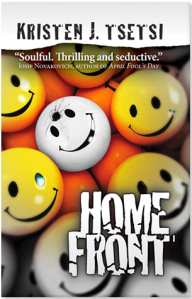 Homefront deals with the emptiness in Mia’s life after her boyfriend, Jake, is deployed to Iraq. A literary novel, it shies away from lurid plot in favor of the use of language to evoke the protagonist’s inner struggle. Kristen Tsetsi is certainly in great command of language and craft, which should not be surprising—her fiction has been published in Storyglossia and other respectable venues.
Homefront deals with the emptiness in Mia’s life after her boyfriend, Jake, is deployed to Iraq. A literary novel, it shies away from lurid plot in favor of the use of language to evoke the protagonist’s inner struggle. Kristen Tsetsi is certainly in great command of language and craft, which should not be surprising—her fiction has been published in Storyglossia and other respectable venues.Mia’s struggle with herself, manifested in loneliness and confusion, is a common one, affecting many women whose men are deployed abroad. But Mia’s struggle is made harder not by the potential temptations to her fidelity to Jake but by the breadcrumbs left here and there that lead Mia to question just how well she really knows Jake. Consequently, a sense of foreboding weaves through the story, revealing that the relationship between Mia and Jake is troubled, uncertain, and perhaps ultimately fatally flawed. Certainly it seems to be missing in action in the end of the story.
There is a kind of apathy, too, in Mia’s character. She seems to wax and wane, developing a relationship with Donny “Doc” Donaldson, a Vietnam era alcoholic vet, yet this relationship does not go anywhere. Mia seems stuck, unsure of where she stands with Jake, and unwilling to outright betray him.
Like the war front, Homefront is a place of struggle, this one taking place in the hearts and minds of those left behind, and like in real combat, feelings and relationships can become missing in action. This is a thoughtful and elegant book; the writing immersive, evocative, and polished; the structure reflecting the sense of dislocation and of something missing in Mia’s life.
She is one of them, one of the others. The man she cares about is here, safe with her. She can’t understand about dusk, the sun’s evil teasing. The time of evening too far from sleep and an ‘x’ across another day, but too close to darkness and the hollow air of no conversation that amplifies the TV sounds of over-acted dialogue and rehearsed applause. Denise doesn’t know the taunting, subtle fade that cues the lighting of yellow windows, the drawing of curtains to hide people living normal lives, eating dinner, yelling top floor to bottom about who wants milk and where are the scissors. She would have little to say about time spent staring out the window at shapeless clouds and cracked sidewalks and meticulously trimmed shrubs, all of it so cheerful and commonplace while over the rooftops and trees and a plane-ride away, “everyday” is mission-planning and mortar fire and grass is something they might find tucked in the fold of a letter.
3 comments:
Sounds awesome. I'll be buying a copy.
Man, the reviews just keep getting better.
And I've got to say, that is one of the best covers I've ever seen.
-Will Entrekin
n.frank - thank you!
Will - thanks to you, too! I think that's the first time I've heard that about the cover. I'm no graphic artist...
Post a Comment